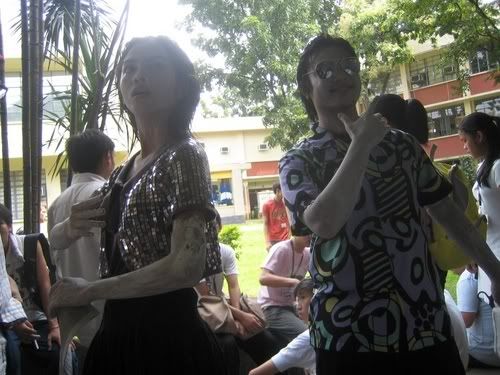Protest to power
MANILA, Philippines—President Macapagal-Arroyo has spoken.
“Let us now all pray, reflect and join hands to make the Estrada pardon a powerful force for righteousness, compassion, healing, national stability and advancement. The people deserve peace, order and political and economic stability. We have been through many upheavals. The people deserve a stable government and economic progress. That is what they are getting now,” Ms Arroyo said.
The decision to grant former President Joseph Ejercito Estrada pardon was a move that caused Ms Arroyo great agony for all of 30 minutes. In the end, she looked to the Bible for inspiration. Perhaps the President wandered into Matthew’s parable of the unmerciful servant—the luckless man who was forgiven and yet chose not to forgive. And so his master turned him over to the jailers to be tortured, until he should pay back all he owed. “This is how my heavenly Father will treat each of you unless you forgive your brother from your heart.” And it would be reasonable to see the logic of the President’s action—after all, with an administration knee-deep in corruption scandals, bribery charges, accusations of cheating and human rights violations, forgiving a fellow culprit sets a precedent for future forgiveness.
Yet forgiveness is an interesting thing, as Bishop Joseph Butler says, a “forswearing of resentment,” a “resolute overcoming of anger and hatred.” It requires, among other things, repentance—an admission that injury was done, an acknowledgement of responsibility and regret, and a promise of change. The prodigal son, after all, had to run home to throw himself at his father’s mercy.
Even Estrada’s champion, Cebu Archbishop Ricardo Cardinal Vidal, who signature is affixed to a letter pleading for his pardon, preaches that while “God’s mercy is boundless for repentant sinners,” Estrada “must first acknowledge his sins, seek forgiveness and make amends for damages done.” Even by the standards of the Bible, by which Arroyo swears, Estrada’s pardon falls flat.
There has been no attempt at repentance from Estrada. Just yesterday, Estrada announced to a 3,000-strong in San Juan that he has never been corrupt, in spite of the Sandiganbayan decision that convicted him of plunder beyond reasonable doubt. “The verdict of our people and history is far more important to me than [that of] any court of this land,” he announced.
Acting Justice Secretary Agnes Devanadera said Estrada’s acceptance of the pardon was tantamount to an admission of his being guilty of plunder. “I see it as a matter of semantics. In ordinary life, would you ask for pardon if you do not recognize your guilt?” she said.
But it isn’t forgiveness Erap wants; it is freedom. That is what pardon is for him. Just last month, after the guilty verdict, he claimed that he was prepared to face the charges, and that “my personal freedom is no longer important.” And yet today he is a free man. He withdrew his petition for reconsideration not because he repented, but because he wanted to be free. Before leaving his Tanay detention-home, Estrada said: “There is no substitute for freedom.” And so he is back, and as Lanao del Norte Rep. Vicente Belmonte said, “Estrada can still be a kingmaker.”
Yet even that bastion of Catholic morality, the Catholic Bishops’ Conference of the Philippines, in a recent statement, asked where justice is in the pardon granted to Estrada, when so many with lesser crimes and less power breathe the stench of crowded jail cells. And this is why pardon, although within the President’s power, is an insult to the Filipino people. The law exists to make possible the functioning of civilized life. That there are men who can rape 5-year-old girls in this country essentially means that left on its own, civilization isn’t at all that civilized. It is the law that sets the most basic requirements of humanity, and it is the fear of punishment that enforces that law. Without punishment, laws essentially become toothless dragons, all sound and fury without the ability to deter or deny. So forgive, by all means, but punish too. As Thomas Hobbes says, it is the only way to keep civilization safe.
Estrada’s pardon, no matter how many ways it is explained, is essentially the triumph of power and influence over law. There are still 70-year-old men in the city’s jails. There are men whose mothers have died without seeing their sons. There are men who have stolen purses worth far less than one of Estrada’s meals, but their punishments have no reprieves from magnanimous presidents. This is not what justice should be, power should be no reason for lady justice to flip up her blindfold. It sends out one message—impunity for those in power.
In the face of this mockery of forgiveness, there is a reason for resentment. According to sociologists Murphy and Hampton, the primary value defended by resentment is self-respect. A person who does not resent moral injuries done to him is almost necessarily a person lacking in self-respect. The land of the free has been forced to spread its legs for a mustached criminal with a pompadour, and then rewards that same man with a handshake and a kiss. So he walks away with a smirk, the same way so many of the men and women who violated the country have, so much so that rape is something we expect. So we rail at the pinpricks, condemn the Malu Fernandezes, petition the producers of “Desperate Housewives,” in the hope that we can get some of that lost dignity. And that’s well and good, it proves we’re still alive—but are doctors and OFWs the only people we’re willing to stand up for?
By all means, let us resent—resent the moral injury against the country, resent the arrogance that assumes we are so lacking in ego that we care nothing for our dignity. Resentment is both a protest against injustice and a defense of self-respect. We’re the battered wives who take every blow and forgive the drunken louts who smile at us the next morning. We’re the admiring crowd that steps aside for the tall woman with a thousand shoes. What Nietzsche says applies to the Filipino—here, forgiveness is a vice, not a virtue.
This pardon does not mean stability, or healing, or justice. It is Estrada’s middle finger shoved up the country’s collective consciousness, but it’s happened so often that it feels almost normal.


 [na may smiley sa ym]. parang naeequate na ang matinding kalungkutan ay nag-uugat talaga sa heartbreaks.
[na may smiley sa ym]. parang naeequate na ang matinding kalungkutan ay nag-uugat talaga sa heartbreaks.

